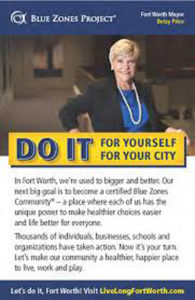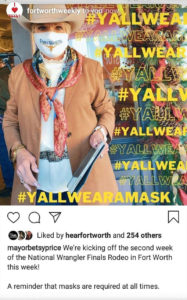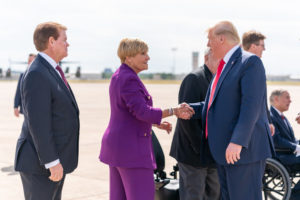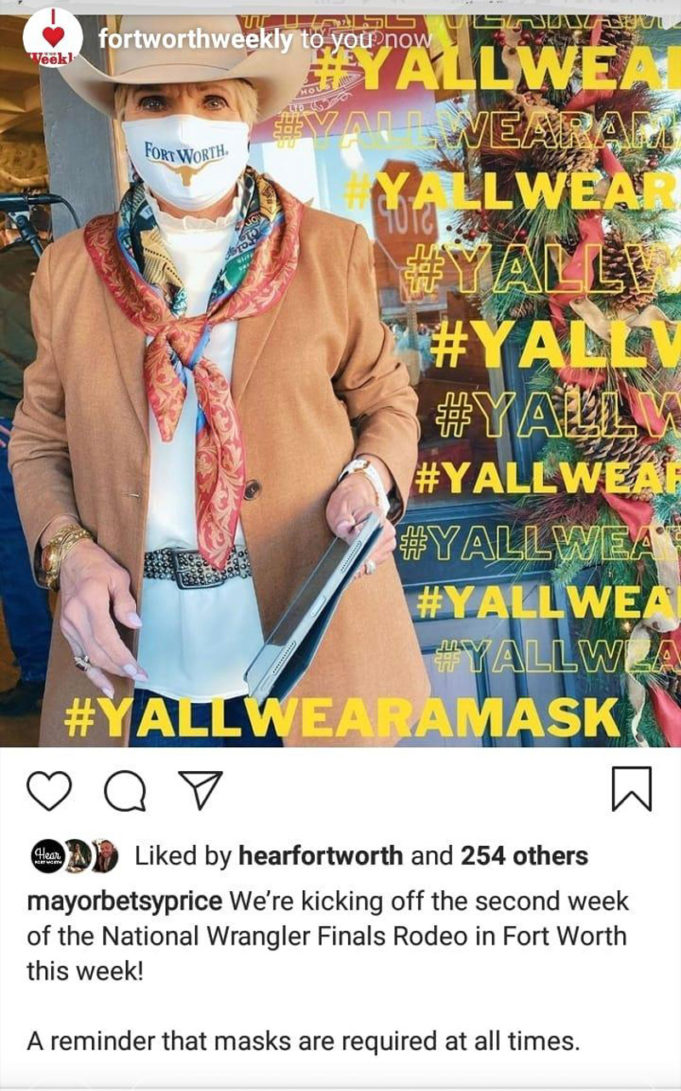Speaking at City Hall and surrounded by family, Mayor Betsy Price reflected on her nearly 10 years in office.
“Serving as mayor has been one of the greatest joys of my life, next to having my children and grandchildren,” she said last week. “Today, I announce that I will not seek a sixth term. It’s a hard decision, but it is the right thing at this time. Coming to that conclusion did not come lightly. I’ve been in conversation with my children, grandchildren, husband, and minister for some time now. There’s no perfect answer as to the time when you should step aside, but you should step aside when you have the feeling that you are ready. Just as I was called to do this job, I feel called to step aside.”
As Price touted her achievements, the health and well-being of Fort Worthians was a recurring theme. The six-year partnership with Blue Zones measurably improving the health of Fort Worthians was one such example she gave.
“I’m very proud of that,” she said.
Amid largely positive comments on the Facebook Live stream came a rebuke.
“How are we one of the healthiest communities when we have an area with the lowest life expectancy in Texas?” one woman commented, referring to Fort Worth’s 76104 ZIP code. The average lifespan in the largely Black community is 66.7 years — far below Texas’ average lifespan of 78.5 years. The study by UT Southwestern Medical Center found a direct and consistent link between poverty and a shorter expected lifespan.
If success were measured by population growth and development in Fort Worth’s urban core, Price could count herself as one of the most successful mayors in recent decades. As she noted in her speech, Fort Worth has surpassed 900,000 residents — a roughly 20% increase since she took office in 2011. Price’s tenure saw the opening of Sundance Square Plaza (the 55,000-square-foot palazzo located downtown), the revitalization of the Near Southside, and the launch of Crockett Row in the West 7th Street corridor, and many other locales that now define urban life in Fort Worth.
Former Speaker of the Texas House of Representatives Joe Straus recently tweeted that “Mayor Betsy Price has led Fort Worth through a very consequential decade of growth and advancement. [She was] never afraid to speak her mind and always put her community first. Always leading with grace and grit, she is among the best public servants in our state.”
Price’s folksy charm and go-to greeting of “Howdy, y’all!” have become synonymous with the City Where the West Begins. Having a five-term white city leader has also been a reminder of where Fort Worth’s political power continues to lie. Unlike most other large cities, Fort Worth has never had a Black mayor.
“I’m glad Betsy Price is not running again,” said Pamela Young, lead criminal justice organizer with the social justice grassroots group United Fort Worth. Price “did not represent me or people who look like me,” said Young, who is Black. “She didn’t have to look like me to represent me, but she chose to govern in such a way that she completely disregarded and further marginalized this city’s most marginalized people — during some of our most vulnerable times.”

Courtesy of Blue Zones
While Fort Worth can now boast a demonstrably healthier citizenry and a broad and robust tax base, for social justice-minded (or simply non-white) residents, the names Jacqueline Craig — the Black woman who was bullied then arrested by a white police officer in 2016 — and Atatiana Jefferson — the 28-year-old Black woman who was shot and killed by a white police officer as she played video games in her mother’s house — raise difficult questions about how far Fort Worth has come in 10 years.
The coming weeks will determine who inherits Price’s trove of campaign contributors. Price, a Republican, had $464,700 on hand and spent $169,000 when she defeated Democrat Deborah Peoples in the 2019 mayoral election. Peoples had $10,800 on hand and spent $62,600 in the race. Races for mayor in Fort Worth are officially nonpartisan, but political affiliation dictates which groups receive campaign contributions.
Two city councilmembers, one state representative, and the Tarrant County Democratic Party Chair have expressed interest in filling Price’s vacated post.
“I would be honored to serve as our next mayor, and I am prepared to do so,” said District 9 councilmember Ann Zadeh. “In these coming days, it’s crucial that I speak openly and clearly with our citizens from every part of the city about our future, our opportunities, and our challenges. As much as I love Fort Worth, I recognize that the city sometimes bears down on its citizens instead of lifting them up, but I absolutely believe [that] together, we can build a strong, exciting, and equitable future for all of us.”
Brian Byrd, councilmember for District 3, recently announced his intention to run for mayor. State Rep. Ramon Romero, a Democrat whose district represents much of Fort Worth, told NBC 5 that he is “definitely thinking” about running for mayor. Local Democratic Party Chair Peoples would be the most progressive candidate of the four, based on her public statements and commitment to police reforms. Candidates have until Feb. 12 to file for the May 1 election.
*****
Born Barbara Elizabeth Cornelius in 1949, Price is the youngest of four siblings. Growing up in Arlington Heights, she attended South Hi Mount Elementary School, Stripling Junior High School, and Arlington Heights High School, where she graduated in 1968.
The Fort Worth native then earned a degree in biology from the University of Texas at Arlington in 1972. Her early career involved running her own car title and licensing company as part of her father’s car business. Price served on numerous boards and commissions before running for and being elected as Tarrant County Tax Assessor in 2000.
After serving four terms, Democrat Mike Moncrief announced he would not seek reelection. Price entered the nonpartisan race against Democrat Jim Lane. In the final runoff tally, Price earned nearly 56% of the vote and her first term as mayor.
At the July 2010 swearing-in ceremony, Price said, “I’ll be out on the streets in every neighborhood meeting with teachers and parents, visiting CEOs and small-business owners, and staying in touch with pastors and civic leaders.”
Price, who campaigned on enforcing a tight city budget, faced a projected $45 million budget shortfall and the prospect of negotiating a new contract with police during her first year in office. Through strategic cuts, Price balanced the city budget that first year and each year since.
Soon after starting office, Price established Steer Fort Worth to address low voter turnout rates in Fort Worth. The nonpartisan nonprofit for young professionals fosters future civic leaders through volunteer-based community projects and monthly social events.
Staying true to her pledge to be an “on the streets” mayor, Price became a regular attendee or guest at public events, especially when those events involved bicycling. While the day-to-day management of Fort Worth falls on City Manager David Cooke, Price used her influence as the ninth city council vote and (arguably more importantly) her considerable clout as the face of Cowtown to set the agenda on a wide range of initiatives.
In stark contrast to Mayor Moncrief’s blocking of inquiries by the Weekly, Price ensured that city leadership was transparent and responsive to media requests from the city’s alt-weekly newspaper. Longtime Weekly owner Lee Newquist said Price was always pleasant to him even when the Weekly’s coverage of her policies wasn’t favorable.
“Unlike previous mayors or political leaders, she told me personally that she respects the media and would always keep an open dialogue with us,” Newquist said. “She was even one of the first people on the Weekly’s popular Toast & Jam show, where she sang ‘Celebrate.’ In 2014, my mother was about to celebrate her 80th birthday and had a choice of traveling to any city in the U.S. for her party with all her kids and grandkids in attendance. She chose Fort Worth, and 42 people came for that weekend to celebrate her birthday and enjoy all things Fort Worth. Prior to that weekend, I called Betsy to let her know that Fort Worth was chosen for this party and that she should feel great about that. A few days later, Betsy sent me a letter to give to my mother welcoming her to Fort Worth and thanking her for choosing our city for her 80th. I think my mother framed that letter and still has it hanging in her house. Strong leadership with some personality and a friendly touch, that’s Betsy.”

Courtesy of Instagram
In 2014, the Blue Zones Project began several health initiatives in Fort Worth. Blue Zones, which encourages healthy living choices, is sponsored nationally by a for-profit company and locally by Texas Health Resources, and its biggest cheerleader early on was Price. Through videos, ads, and signage, Price became the face of a program that pushed Fort Worthians to make healthy eating choices and walk more often, among other tenets of the Blue Zones philosophy.
The effort demonstrably paid off as Fort Worth dropped in the Gallup index over the subsequent several years. A Blue Zones spokesperson said at a recent American Public Health Association meeting that Fort Worth has seen a 31% decrease in tobacco use since 2014, although part of that trend may be due to the city’s 2017 indoor smoking ban.
Price launched Read Fort Worth in partnership with the Fort Worth school district in 2016 with the aim of ensuring that all third-graders can read at grade level by 2025. The multifaceted initiative works through a strategic framework to connect “partners” with schools, track progress, outreach to parents, and ensure consistent teacher quality throughout the district’s classrooms.
Civil unrest and demands for police reforms would define the second half of Price’s tenure in office even as her annual State of the City speeches held fast to narratives of economic development and fiscal responsibility.
*****
In late 2016, Jacqueline Craig called Fort Worth police to report a neighbor who had assaulted Craig’s young son. The neighbor, Itamar Vardi, was cited one month later for assault by offensive contact, a Class C misdemeanor. Although Craig’s son was the victim of a crime, officer William Martin chose to attack Craig verbally when he arrived on the scene.
“If you keep yelling at me, you’re gonna piss me off, and I’m gonna take you to jail,” the officer threatened before wrestling Craig to the ground and also arresting her two teenage daughters.
The heavy-handed arrest, caught on Facebook Live, stirred local protests and national condemnation. Martin was suspended for 10 days, and charges against Craig and her daughters were later dropped. Typically humdrum city council meetings became boisterous affairs, and many of the verbal attacks were aimed directly at Price.
In response to public uproar over Craig’s arrest, city councilmembers and Price formed the Race and Culture Task Force to “listen, learn, build, and bridge in order to create an inclusive Fort Worth for all residents.” The task force, formed in mid-2017, consisted of 25 co-chairs and members who worked for nearly one and a half years to examine racial and economic inequities within Fort Worth.
“One of the things that kept coming back to us [in comments] was that the city wasn’t trying hard enough” to improve race relations and economic opportunities for minorities, said Bob Ray Sanders, task force co-chairman and civil rights advocate, at the time. “Many of the people who talked to us felt that city leaders don’t care about these issues. They feel that no matter what we recommended, the city will do nothing about it.”
The task force’s interim report found that the complaints by Fort Worth’s minority communities were due to “systemic, structural, and institutional racism” in Fort Worth and not simply personal animosity on the part of Fort Worth residents.
“Some of your recommendations are a bit eye-opening but not totally surprising,” Price said in late 2018 as she and city councilmembers adopted 22 recommendations by the task force. “They’re the kind of eye-opening where it’s good for us to see and to take a hard look at where we are.”

Courtesy of the White House
Fort Worth leadership may be backpedaling on one critical task force recommendation: the formation of an independent redistricting commission. The citizen-driven groups reduce the risk of gerrymandering and self-interested land grabs on the part of city councilmembers. Austin employs a 14-member redistricting commission that is in the process of redrawing the city’s 10 districts for the upcoming November 2022 municipal elections.
Assistant Fort Worth City Manager Fernando Costa said in an email that city councilmembers “declined to appoint a charter review task force” and opted to form an independent redistricting commission.
Allowing city councilmembers to retain control over redistricting “promotes accountability and democracy because citizens elect their councilmembers to make these kinds of decisions and can hold their elected officials accountable for making such decisions responsibly,” he said.
Just days after the formation of the Race and Culture Task Force, Price and city councilmembers were faced with an emotional vote on a controversial senate bill, SB 4, the so-called “show me your papers bill” that the Texas Legislature passed in 2017. Leadership at every major Texas city decried the bill as racist. One young college graduate and Deferred Action for Childhood Arrivals (DACA) recipient told me around that time that the bill made her terrified to drive (“ Texas Power Plays,” Oct. 2017).
During a heated August 2017 city council meeting, Price listened to dozens of locals plead for the mayor and city council to join a lawsuit against SB 4. Fort Worth was the largest Texas city not to sign on to the effort. Price repeatedly told the packed City Hall meeting that Fort Worth was a compassionate city as she voted, along with four city councilmembers, to not join the litigation. SB 4 remains the law of the land in Texas.
United Fort Worth leadership and several groups that advocate for the Latinx community subsequently pledged to oust Price in upcoming elections.
In late 2019, Atatiana Jefferson was killed by a white police officer, Aaron Dean. Her death drew national outrage and raised questions about policing practices in Fort Worth. Jefferson was playing a video game with her nephew, Zion Carr, when she was shot through a window by Dean, who was subsequently fired and remains free on bail while he awaits trial for murder. Jefferson was the sixth Black person shot and killed by Fort Worth police that year. During a recent phone interview, Jefferson’s sister, Amber Carr, said Price has never spoken at length to the Jefferson/Carr family. In October, family and friends of Jefferson held a car parade and candlelight vigil that marked the one-year anniversary of Jefferson’s death. Not one Fort Worth elected official attended.
In late March, flanked by county head Judge Glen Whitley, Price and Arlington Mayor Jeff Williams called on their respective constituents to stay at home to combat the spread of COVID-19. Strict stay-at-home orders were placed the day before.
“We’re going to flatten this curve, and it will get us back to work faster,” Price said. “It isn’t lost on us that these are incredibly hard times, but if you’re sick in the hospitals, we will really be in trouble. By closing for a short amount of time, we believe we can stop that.”
By April 3 (the date many expected the restrictions to be lifted), Fort Worth was seeing increasing COVD-19 infection rates. By mid-April, Tarrant County tallied 29 fatalities due to the disease. Price reminded Fort Worth residents to abide by the shelter-in-place order and to follow safety protocols like social distancing and wearing face masks.
One month later, George Floyd, a 46-year-old Black man, left a Minneapolis convenience store before being approached by four police officers. A store clerk had called 911 and told police that Floyd had bought cigarettes with a counterfeit $20 bill. During the subsequent arrest, one officer pressed his knee on Floyd’s neck as three officers looked on. Floyd died on the scene. Five days later, Price issued a public statement over Floyd’s murder and the resulting civil unrest.
“As mayor, I remain committed to continuing the work we have started to root out racism, inequities, and disparities at a systemic and policy level,” Price said. “Just as importantly, I am committed to continuing the work within myself — to examine my own heart and to grow in my own understanding.”
Weeks of nonviolent protests against police brutality and systemic racism followed. Price joined a June 3 protest and even chanted “George Floyd” alongside hundreds of protesters. Aside from the May 31 use of tear gas and other nonlethal weapons by Fort Worth police, the city, under Price’s leadership, largely avoided the violent clashes between protesters and police that characterized marches in large urban centers across the country that summer, although local protesters were united in their belief that Price represented police unions and special interests.
Although Price never publicly espoused the types of racist rhetoric and fringe conspiracy theories that have defined the Trump presidency, her frequent visits to Washington, D.C., to attend presidential events and her unwillingness to denounce the president’s repeated false statements (particularly those that targeted minority groups and Democrats) framed how many in Fort Worth viewed Price.
In December, many locals decried the lack of enforcement of Texas’ mask mandate as thousands of fans for the National Finals Rodeo (NFR) descended on Cowtown. The 10-day-long event had spent the previous 15 years in Las Vegas, but COVID-19-related restrictions in Nevada prevented large ticketed events due to the largely uncontrolled pandemic. Price and other area mayors warmly welcomed the visitors who frequented Fort Worth’s downtown and North Side when they weren’t watching the competition at Globe Life Field in Arlington.
“These tourists are blatantly super-spreading in a Mexican neighborhood with little regard for the employees and families that make tourism happen,” said one Northside resident who asked to remain anonymous. “My family of Northsiders has already lost several family members to COVID because of tourists’ total disregard for the neighborhood’s health.”
Price made one Instagram post that encouraged visitors to wear a mask. Fort Worth police refused to enforce the state mandate.
In response to the violent mob that recently breached the U.S. Capitol in a failed attempt to fulfill Trump’s desire to overturn the landslide victory of President-elect Joe Biden, Price tweeted, “I am horrified by what is happening in our nation’s capital. It is devastating that our country has become this fractured. Violence is never the answer. It is my hope and prayer that cooler heads will prevail and we will have a peaceful transition of power.”
Following the violent death of Capitol Police officer Brian Sicknick, who died protecting the building and its occupants from pro-Trump insurrectionists, and the scope of the failed assault on democracy, Price’s words amount to “weak platitudes,” said Max Krochmal.
The author and TCU professor said that “for nearly a decade, Betsy Price has served as a primary obstacle to Fort Worth’s transition into a modern, major American city. Presented with the opportunity of unprecedented population growth — much of it driven by recent immigrants to the U.S. — Price has consistently chosen to defend outdated, undemocratic political processes as well as public policies that benefit old, moneyed interests, rather than embracing diversity and change.”
The efforts to establish Blue Zones and cycling trails, he said, contrast with public policy decisions that “prioritized the needs of private developers and, at times, rewarded outright cronyism. There were multiple moments in Price’s long administration when she could have used her office to substantively advance human rights and democracy, but each time she responded to the city’s very real challenges with duplicitous PR campaigns and blue-ribbon committees that sidestepped the underlying issues.”
Price said in an email that it was hard to pinpoint a single legacy that she is most proud of.
“We accomplished so much together over the last 10 years,” she said. “I am incredibly proud of the work we did to ensure our city is in a sound fiscal position, leading with fiscal responsibility, lowering the city’s tax rate 12 cents in four years, and solving the pension crisis. I am also proud of the initiatives we have launched aimed at community engagement and well-being, including FitWorth [a local movement that encourages healthy choices], Blue Zones, Steer Fort Worth, and Read Fort Worth. We have also made strides in building a stronger, more unified Fort Worth through difficult conversations and the recommendations of the Race and Culture Task Force. I hope to see this progress continue.”
The mayor went on to say that she wishes for Fort Worthians to continue the hard work that is already underway.
“We’ve made progress around transportation and mobility. We are building a community that is diverse and inclusive — a Fort Worth that is welcoming to all.”













Trump’s favorite mayor. He said so himself.
She did a good job during difficult times.
i am not a resident of fort worth, but have lived my entire 60 years with fort worth being my nearest “big city”. when i am in another part of the state or country, my answer to where are you from is a little town near fort worth, never dallas. i am happy that fort worth has avoided most of the problems of other big cities. i think price has done a great job of continuing to grow fort worth but keeping the heritage of cowtown. i hope the next mayor is able to do the same.